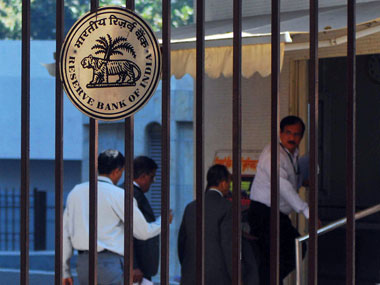The RBI’s decision to buy government bonds through open market operations looks more like deficit financing than liquidity easing. The central bank will buy Rs 10,000 crore of government bonds through purchase auctions on 24 November 2011 and, in all likelihood, will announce further purchase auctions of Rs 10,000 crore in the coming weeks.
Every purchase auction will be followed by a government bond auction of Rs 13,000 crore as the government borrows to finance its rising fiscal deficit. The back-to-back purchase auction and government bond auction raises eyebrows on whether the RBI is being forced to finance the government in the guise of liquidity easing measures.
[caption id=“attachment_139189” align=“alignleft” width=“380” caption=“Reuters”]  [/caption]
Liquidity will have to be eased by at least Rs 60,000 crore to bring the system liquidity within the comfort zone of the RBI, which at 1 percent of net demand and time liabilities, or NDTL, works out to around Rs 55,000 crore.
The market at present is borrowing over Rs 1,25,000 crore from the RBI on a daily basis and in order to bring down this borrowing the RBI will have to buy government bonds for around Rs 60,000 crore in coming weeks. To put this in perspective, the RBI, by buying government bonds for Rs 60,000 crore will be financing around 15 percent of the government borrowing for this fiscal.
The RBI has stated that it will not use the CRR (cash reserve ratio) to infuse liquidity into the system as it is seen as a monetary signal rather than a liquidity tool. A 1 percent cut in CRR will add around Rs 55,000 crore into the system thereby easing the liquidity pressure.
The question to ask is, is implied deficit financing better than implied monetary easing measures? The answer is no. Implied deficit financing sends out completely wrong signals to the markets.
The first signal the market will perceive is that the RBI is carrying out quantitative easing measures, which is negative for both inflation and the currency. Inflation is trending at 9.7 percent levels, the fifth consecutive month of over 9 percent inflation, while the Indian rupee has fallen by over 15 percent against the US dollar over the last three months.
The second signal is that the government, when it finds a captive buyer of its bonds in the form of the central bank will not act to reduce its fiscal deficit. The government is likely to overshoot its deficit by at least 1 percent this fiscal and recent comments by the finance minister of going easy on reducing the deficit is not at all comforting. At a time when markets are plundering bonds and currencies of high-debt countries, a rise in level of fiscal deficit is extremely dangerous for the country.
The RBI has been highlighting the fiscal profligacy of the government in all its policy statements. Sounding a warning on deficit and then supporting the deficit by buying bonds is contradictory.
On the other hand, a CRR cut, even if taken by the market as a monetary easing measure, will not result in a sharp fall in interest rates in the economy. Liquidity will ease but it will only bring down liquidity from highly negative to manageable levels.
Government borrowing will continue as usual and the markets will look at the government’s effort to contain its fiscal deficit before taking down bond yields. Government bond yields at stickily higher levels (at multi year highs) due to poor government finances will not bring down lending rates and the RBI will not have to worry about credit growing at a faster pace due to a cut in CRR.
The RBI should also look at other means of easing system liquidity if it does not want to use CRR. In the absence of CRR, buying government bonds to ease liquidity is harmful to the economy.


)
)
)
)
)
)
)
)
)



